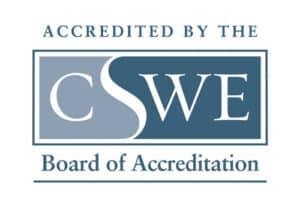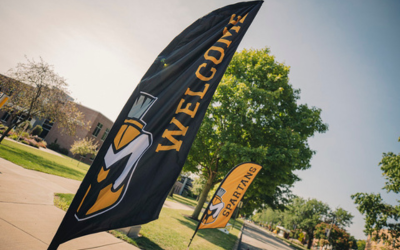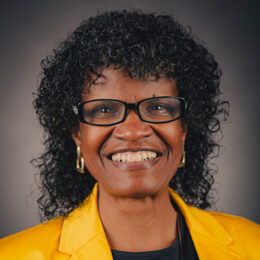Social Work
From Manchester University, social work graduates go forth believing that every person has value – and the right to grow and develop to their fullest potential.

Do you have a desire to help people in need?
Do you like interacting with people – discovering similarities, honoring differences? Are you the one your friends turn to when they need someone to listen? Do you want to help others heal, grow, and achieve their full potential? Are you concerned for human rights and want to see people treated fairly and with dignity? Social Work may be your future!
Program Information:
Major | BS
- 58 Credit Hours
Location
- North Manchester


Why Choose MU for Social Work?

Strengths and Distinctiveness
Accreditation
 The Manchester University Social Work Program is accredited by the Council on Social Work Education’s Commission on Accreditation. The program has been continuously accredited by CSWE since 1977.
The Manchester University Social Work Program is accredited by the Council on Social Work Education’s Commission on Accreditation. The program has been continuously accredited by CSWE since 1977.
Academic Quality
The Social Work Program faculty take our commitment to academic quality seriously. Every year, we assess our effectiveness in preparing students for professional social work practice and make improvements to the Program accordingly. Review recent program outcomes data.
Social Work Licensure
As a CSWE-accredited baccalaureate program, the Manchester University Social Work Program prepares students for entry-level licensure as a professional social worker. In Indiana, this is the LBSW (Licensed Bachelor Social Worker) credential. For Indiana licensure laws, see Indiana Professional Licensing Agency.
Graduate Education
What You Can Do with Your Social Work Degree
Case Manager
Coordinate services and support plans for individuals and families
Child Welfare Specialist
Advocate for and protect at-risk children and youth
Mental Health Advocate
Support people who are facing mental health challenges
Substance Abuse Recovery Support
Help individuals recover from addiction through guidance and support
MU Social Work graduates are prepared for these professional roles and more in a wide array of social service fields, including:
- Aging / Gerontology
- Criminology / Probation / Victim Advocacy
- Housing and Homelessness
- Addictions / Substance Abuse
- Economic and Community Development
- Mental Health
- Domestic Violence
- HIV/AIDS Services
- Youth Services / Youth Development
- Community Organizing
- Health Care / Hospitals
- Hospice / End-of-Life Care / Palliative Care
- Disabilities / Rehabilitation
- Immigration and Refugee Services
- LGBTQ Services
- Foster Care / Adoption
- Child Abuse and Neglect / Family Preservation
- Residential Services
- Schools / Early Childhood Services
- Pregnancy Services / Family Planning Services
- Legislative Advocacy

Average Starting Salary for Social work Degree Holders
The median salary for all social workers (bachelor’s, master’s, and doctoral degree levels) is $61,330, with higher degrees earning higher salaries. Salaries also vary by chosen field and geographic location. The demand for social workers is strong. Overall employment of social workers is projecte to grow 7 percent from 2023-2033, faster than the average for all occupations.

How the MU Social Work Program Supports Your Growth
Social Work Program Admissions
The Manchester University Social Work Program, a baccalaureate degree program accredited by the Council on Social Work Education, graduates generalist social work professionals of ability and conviction who respect the infinite worth of every individual. Graduates of the program improve the human condition by applying social work knowledge, values, and skills to enhance the well-being of all people, especially those who are vulnerable, oppressed, or living in poverty; to alleviate poverty and oppression; and to promote social, racial, economic, and environmental justice and peace. The program also prepares students for graduate studies in social work.
Admission into the Social Work Program takes place in two phases:
- initial admission to major and
- admission to the senior social work practice block (SOWK 375, 384, 475, 476 and 477).
Admission to the program should be completed during the sophomore year and requires:
- Regular admission into Manchester University
- Achievement of sophomore status
- Minimum cumulative grade point average of 2.0 on a 4.0 scale
- Satisfactory completion of SOWK 110 and enrollment in or completion of SOWK 228
- Personal integration and aptitude for generalist social work practice
- Satisfactory progression toward the program’s core competencies, as evidenced by:
1. student’s personal statement
2. one reference from one Manchester University social work faculty
3. pertinent work or volunteer experience
4. unofficial transcript
5. an admissions interview
Admission to the senior social work practice block should be completed during the spring semester of the junior year and requires:
- Completion of a minimum of 76 credit hours
- Admission to the Social Work Program
- Previous participation in a Celebrating Diversity Workshop
- Demonstration of satisfactory progress (e.g., minimum 2.0 overall GPA, progress toward program’s core competencies)
- Remediation of any areas of concern identified at admission to the social work program, as evidenced by:
1. student’s personal statement and self-evaluation
2. pertinent work or volunteer experience
3. unofficial transcript
4. an admissions interview.
Applications for admission to the Social Work Program and to the senior social work practice block are available from the Social Work Program director.
Graduate Education
MU social work alumni are also well-prepared for graduate study. Many of our alumni go on to a Master of Social Work program, usually gaining advanced standing in those programs. A master of social work degree is required for clinical social work practice, some administrative positions, and college-level teaching. A PhD is increasingly required for college-level teaching. Other graduate program possibilities for our alumni include law school or programs in sociology, psychology, counseling, education, political science, economics, non-profit or public administration, or other service-oriented professions and the social sciences. Search CSWE’s Directory of Accredited Programs for master’s programs in social work.
Advising
Social work students are paired with a social work faculty member who provides career guidance, academic advising, and overall mentoring.
Experiential Learning
MU Social work students learn in the field as well as in the classroom. From field trips, to service projects, to your field instruction semester, you will gain invaluable experience and confidence alongside established social workers.
Meet the Faculty
Social Work Learning Outcomes
Program Learning Outcomes
1. Demonstrate Ethical and Professional Behavior
Student Learning Outcomes:
- make ethical decisions by applying the standards of the NASW Code of Ethics, relevant laws and regulations, models for ethical decision-making, ethical conduct of research, and additional codes of ethics as appropriate to context
- use reflection and self-regulation to manage personal values and maintain professionalism in practice situations
- demonstrate professional demeanor in behavior; appearance; and oral, written, and electronic communication
- use technology ethically and appropriately to facilitate practice outcomes
- use supervision and consultation to guide professional judgment and behavior
2. Advance Human Rights and Social, Racial, Economic, and Environmental Justice.
Student Learning Outcomes:
- advocate for human rights at the individual, family, group, organizational, and community system levels
- engage in practices that advance human rights to promote social, racial, economic, and environmental justice
3. Engage Anti-Racism, Diversity, Equity, and Inclusion (ADEI) in Practice.
Student Learning Outcomes:
- demonstrate anti-racist and anti-oppressive social work practice at the individual, family, group, organizational, community, research, and policy levels
- demonstrate cultural humility by applying critical reflection, self-awareness, and self-regulation to manage the influence of bias, power, privilege, and values in working with clients and constituencies, acknowledging them as experts of their own lived experiences
4. Engage in Practice-informed Research and Research-informed Practice.
Student Learning Outcomes:
- use practice experience and theory to inform scientific inquiry and research
- apply critical thinking to engage in analysis of quantitative and qualitative research methods and research findings
- use and translate research evidence to inform and improve practice, policy, and service delivery
5. Engage in policy practice.
Student Learning Outcomes:
- identify social policy at the local, state, federal level that impacts well-being, service delivery, access to social services
- assess how social welfare and economic policies impact the delivery of and access to social services
- apply critical thinking to analyze, formulate, and advocate for policies that advance human rights and social, economic, and environmental justice
6. Engage with Individuals, Families, Groups, Organizations, and Communities.
Student Learning Outcomes:
- apply knowledge of human behavior and the social environment, person-in-environment, and other multidisciplinary theoretical frameworks to engage with clients and constituencies
- use empathy, reflection, and interpersonal skills to effectively engage diverse clients and constituencies
7. Assess Individuals, Families, Groups, Organizations, and Communities.
Student Learning Outcomes:
- collect and organize data, and apply critical thinking to interpret information from clients and constituencies
- apply knowledge of human behavior and the social environment, person-in-environment, and other multidisciplinary theoretical frameworks in the analysis of assessment data from clients and constituencies
- develop mutually agreed-on intervention goals and objectives based on the critical assessment of strengths, needs, and challenges within clients and constituencies
- select appropriate intervention strategies based on the assessment, research knowledge, and values and preferences of clients and constituencies
8. Intervene with Individuals, Families, Groups, Organizations, and Communities.
Student Learning Outcomes:
- critically choose and implement interventions to achieve practice goals and enhance capacities of clients and constituencies
- apply knowledge of human behavior and the social environment, person-in-environment, and other multidisciplinary theoretical frameworks in interventions with clients and constituencies
- use inter-professional collaboration as appropriate to achieve beneficial practice outcomes
- negotiate, mediate, and advocate with and on behalf of diverse clients and constituencies
- facilitate effective transitions and endings that advance mutually agreed-on goals
9. Evaluate Practice with Individuals, Families, Groups, Organizations, & Communities.
Student Learning Outcomes:
- select and use appropriate methods for evaluation of outcomes
- apply knowledge of human behavior and the social environment, person-in-environment, and other multidisciplinary theoretical frameworks in the evaluation of outcomes
- critically analyze, monitor, and evaluate intervention and program processes and outcomes
- apply evaluation findings to improve practice effectiveness at the micro, mezzo, and macro levels
Non-Discrimination in the Admission Process
Manchester University is committed to non-discrimination in campus life. The University does not discriminate on the basis of national origin, ancestry, race, color, age, sex, gender identity or expression, sexual orientation, familial status, religion, disability or veteran status in admissions or any area of campus life, including its educational programs, scholarships and loan awards, residence life programs, athletic programs, extracurricular programs, promotion and tenure policies and practice, and alumni affairs.
Manchester University is committed to carry out the provisions of Section 504 of the Rehabilitation Act of 1973 and the Americans With Disabilities Act, which provide for accessibility of University programs to the physically disabled.







